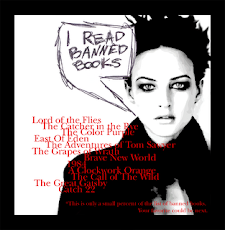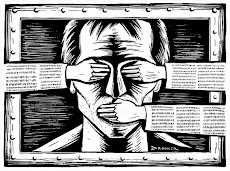 [Hubert Selby: Inscription for Gilbert Sorrentino]
[Hubert Selby: Inscription for Gilbert Sorrentino]Hubert Selby, Jr.:
Last Exit to Brooklyn (1964)
Style
Anthology Texts:
- Hubert Selby, Jr.: from Last Exit to Brooklyn (1964)
- Allen Ginsberg: from Howl (1956)
History of the Ban:
Last Exit to Brooklyn has been censored on both sides of the Atlantic. Several of the chapters had appeared separately in Black Mountain Review, New Directions #17, Provincetown Review and Swank. The section entitled "Tralala" first appeared as a play that was banned from off-Broadway production in 1957. In 1965, in Boston, Massachusetts, a local city attorney sought an injunction against the book, but the complaint was dismissed. The following year, a circuit court in Connecticut issued a temporary injunction against sale of the book, now published by both Grove Press and Dell Publishing, charging that it was "obscene and pornographic." The injunction was overturned and sales were again permitted. The novel has also been banned in Italy and Ireland, and placed on a restricted list in Russia.
The most extensive censorship case occurred in England, where the novel was published by Calder and Boyars. In late 1966, Conservative Member of Parliament Sir Charles Taylor received a copy of the novel, sent to him by Sir Basil Blackwell, member of an Oxford bookselling family and a man in his seventies who claimed that his few remaining years had been "defiled" by reading Last Exit. Disgusted by the book, Taylor alerted the attorney general in June 1967 to register a complaint with the Office of the Director of Public Prosecutions (DPP). That office replied that Taylor was too late to make an effective complaint because over 11,000 copies of the book had already been sold, and sales were slowing. Attorney General Sir Elwyn Jones stated further that "Literary Criticism was almost unanimous that it had literary merit." The publisher taunted Taylor by including his name in their advertisement in The Sunday Times, stating: "Sir Charles Taylor, MP has described Last Exit as filthy, disgusting, degrading. It is one of the most important novels to come out of America .... "
The audacity of the publisher angered another member of parliament. Sir Cyril Black (Conservative), who used the private prosecutions feature of Section 3 of the Obscene Publications Act of 1959 to challenge the publishers. He brought a formal complaint against the book in July 1966, calling upon the publisher to prove that the book had value and to establish why it should not be banned. The magistrate who granted the application was Sir Robert Blundell, a chief opponent of Fanny Hill, who issued a search warrant for members of law enforcement to seize all copies from area bookshops. The trial was held at Marlborough Street Magistrates Court in November 1966, and the numerous prosecution witnesses were consistent in expressing their disgust with the scenes depicted in the novel, especially with the brutal rape and humiliation of Tralala. This section has drawn the greatest objection in proceedings against the book because of the horrifying picture that Selby creates of the humiliation and death of Tralala and the cold indifference of onlookers. The presiding magistrate rejected the book, observing that "this book in its descriptions goes beyond any book of a merely pornographic kind that we have seen in this court [and] ... is more likely to deprave and corrupt than any of those cyclostyled horrors. "
Buoyed by the published opinion of several critics that Britain "had made herself the laughing stock of the civilized world," Calder and Boyars announced that they would continue publication. In response, the DPP announced that it would prosecute, using section 2 of the 1959 act that prohibited "possessing an obscene article for gain." The trial was set for November 1967, and an all-male jury was selected to spare women the embarrassment of reading the material. The trial lasted nine days and brought together numerous prominent witnesses. The prosecution spotlighted David Shepherd, a former cricket star who had taken religious orders and would later become a bishop, who claimed that he had emerged "not unscathed" by reading the novel, although as a social worker in the East End of London he could identify many of the character types among his clients. To counter this testimony, Calder and Boyars assembled a list of nearly 30 writers, critics, professors and members of the media who praised Selby's work and his expression of theme. The effort was fruitless for, after deliberating five and a half hours, the jury declared the book guilty of being obscene and that "the effect of reading the book was to horrify. shock, disgust, and nauseate." Although the judge determined that the book had been published in good faith by a respectable publishing house, he fined Calder and Boyars £100 and ordered them to pay £500 in court costs.
The publishers once again appealed the decision, represented this time by John Mortimer, who convinced the appeal judges that the judge in the earlier trial had not sufficiently explained the complexities of the 1959 act to the jury and had left too much to "commonsense" and not enough to law. As a result, the conviction was overturned and Last Exit was free to appear in a complete and unexpurgated edition. To avoid further embarrassing litigation based on private prosecution, Section 3 of the Obscene Publications Act of 1959 was changed. Last Exit holds the distinction of being the last serious novel, poem or play prosecuted under the 1959 act.– Nicholas J. Karolides, Margaret Bald & Dawn B. Sova, 100 Banned Books: Censorship Histories of World Literature. Introduction by Ken Wachsberger (Checkmark Books, New York, 1999): 382-86.
Style (or Tone of Voice):
Last Exit to Brooklyn was written in an unusual style that ignores most conventions of grammar. Selby wrote most of the prose as if it were a story told from one friend to another at a bar rather than a novel, using coarse and casual language. He used slang-like conjunctions of words, such as tahell for "to hell" and yago for "you go." The paragraphs were often written in a stream of consciousness style with many parentheses and fragments. Selby often indented new paragraphs to the middle or end of the line.
Also, Selby did not use quotation marks to distinguish dialogue but instead merely blended it into the text. He used a slash instead of an apostrophe mark for contractions and did not use an apostrophe at all for possessives.
We'll begin with the book report on Last Exit to Brooklyn, then move on to do the class exercise in pairs or small groups.
Exercise 10:
Spot the Similarities
The 1957 obscenity trial
Howl contains many references to illicit drugs and sexual practices, both heterosexual and homosexual. On the basis of one line in particular
who let themselves be fucked in the ass by saintly motorcyclists, and screamed with joy
customs officials seized 520 copies of the poem on March 25, 1957, being imported from the printer in London.
A subsequent obscenity trial was brought against Lawrence Ferlinghetti, who ran City Lights Bookstore, the poem's new domestic publisher. Nine literary experts testified on the poem's behalf. Supported by the American Civil Liberties Union, Ferlinghetti won the case when Judge Clayton Horn decided that the poem was of "redeeming social importance". The case was widely publicized (articles appeared in both Time and Life magazines). The trial was published by Ferlinghetti's lead defense attorney Jake Ehrlich in a book called Howl of the Censor.
Next week:
Group 5: Book report on The Satanic Verses due.




No comments:
Post a Comment